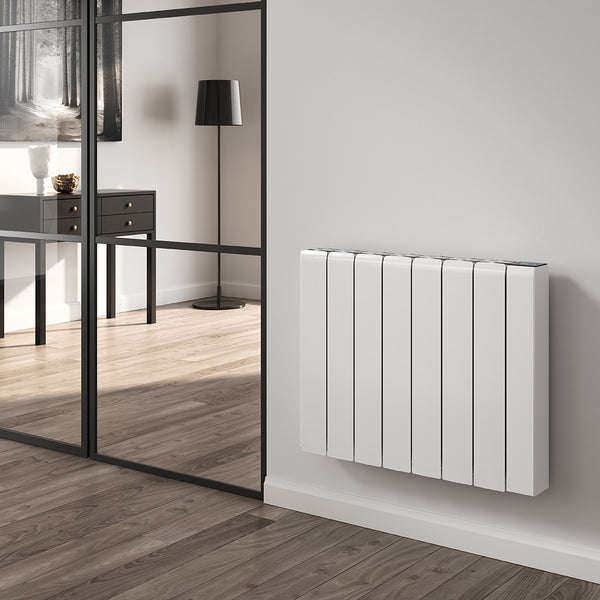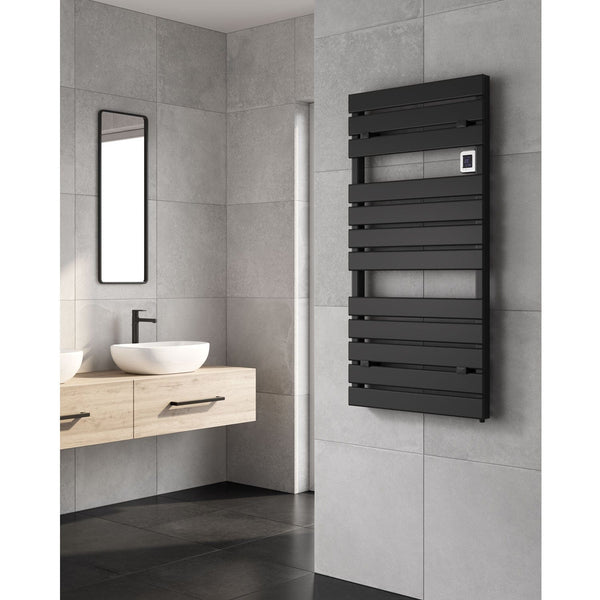Electric Panel Heaters
Handpicked by UK heating specialists with over 10 years' trade expertise. Fast UK Delivery, 5-year warranty & expert sizing advice included.
Welcome to the future of home heating. Electric panel heaters offer a slim, stylish, and highly efficient way to warm any room. Whether you're upgrading an old system or looking for a modern heating solution, this guide covers everything you need to know about panel heaters, from their dual heating technology to smart features and energy-saving benefits.
How Do Panel Heaters Work? A Blend of Convection & Radiant Heat
Electric panel heaters provide warmth using a sophisticated two-pronged approach. Firstly, they work via convection, drawing in cool air, passing it over an internal heating element, and releasing it as warm air that circulates around the room. Secondly, they also emit radiant heat directly from their surface. This radiant warmth heats objects and people in the room directly, much like the gentle heat from the sun, providing a comfortable and all-encompassing feeling of warmth. This dual action makes them both fast to heat a room and effective at maintaining a cosy ambient temperature.
Average Running Costs: Efficient & Controllable
Modern panel heaters are designed for efficiency. Their running cost depends on the heater's power (kW), how long you use it, and your electricity tariff. The table below estimates costs based on the UK average rate of 27p / kWh, but remember that smart features like thermostats and timers will significantly reduce actual consumption by only using power when needed.
| Heater Power | Cost Per Hour (at full power) | Estimate for 4 Hours of Use |
|---|---|---|
| 1.0 kW (Small bedrooms, offices) | ~ 27p | ~ £1.08 |
| 1.5 kW (Master bedrooms, small lounges) | ~ 41p | ~ £1.64 |
| 2.0 kW (Living rooms, open-plan areas) | ~ 54p | ~ £2.16 |
Choosing the Right Size Heater for Your Room
Sizing is key to efficient heating. An undersized heater will struggle, while an oversized one is unnecessary. For a standard, well-insulated room, a good guideline is to use 100 Watts (W) of power per square metre (m²). For rooms with high ceilings or less effective insulation, consider 150W per m².
| Room Area (m²) | Recommended Heater Power (Watts) | Good For |
|---|---|---|
| Up to 10 m² | 1000W (1.0 kW) | Home Offices, En-Suites |
| Up to 15 m² | 1500W (1.5 kW) | Double Bedrooms, Kitchens |
| Up to 20 m² | 2000W (2.0 kW) | Living Rooms, Conservatories |
| 25 m² + | 2500W+ (2.5 kW+) | Large Open-Plan Spaces |
Heater Type Comparison: Panel vs. Other Electric Heaters
| Feature | Electric Panel Heater | Convector Heater | Infrared Heater |
|---|---|---|---|
| Heating Method | Convection + Radiant | Convection Only | Radiant Only |
| Appearance | Slim, wall-mounted, stylish | Often bulkier, freestanding | Very slim, can look like art/mirrors |
| Best For | Primary heating for a whole room | Quick, supplementary heat | Direct, targeted warmth (indoor/outdoor) |
| Smart Features | Excellent (WiFi, Timers, Sensors) | Basic (Thermostat, Timer) | Varies (some have smart controls) |
Key Features to Look For in a Modern Panel Heater
Lot 20 ECODesign Compliance
A mandatory EU/UK standard ensuring heaters have energy-saving features like timers and thermostats. A Lot 20 compliant heater is guaranteed to be efficient and reduce wasted energy.
Smart Controls (WiFi & App)
Control your heating from anywhere using a smartphone app. Adjust temperatures, set schedules, and monitor energy usage on the go for ultimate convenience and savings.
24/7 Programmable Timer
Create detailed heating schedules for every day of the week. This ensures your rooms are warm exactly when you need them and saves money by not heating an empty house.
Precise Digital Thermostat
Accurately measures and maintains the room temperature to within a fraction of a degree. This prevents overheating and temperature swings, providing consistent comfort and efficiency.
Open Window Detection
A smart sensor that detects a sudden drop in temperature (e.g., from an open window) and temporarily switches the heater off to avoid wasting energy trying to heat the outdoors.
Slimline, Wall-Mountable Design
Panel heaters are incredibly thin and designed to be mounted on the wall, saving valuable floor space and providing a clean, minimalist aesthetic that complements any decor.
IP Rating for Bathroom Use
An IP rating (e.g., IP24) indicates the heater is splash-proof and safe for use in bathrooms (in the appropriate zone). An essential feature for adding warmth to damp environments.
Adaptive Start Control
An intelligent feature where the heater learns how long it takes to warm your room. It then pre-heats the room to ensure it reaches your desired temperature exactly at the start of your schedule.
Frequently Asked Questions (FAQ)
What is Lot 20 and why is it important?
Lot 20 is a European regulation, now part of UK law, aimed at improving the energy efficiency of local space heaters. To be "Lot 20 compliant," a heater must have intelligent controls, such as a 24/7 timer, a digital thermostat, and open window detection. Buying a compliant heater ensures you get a modern, efficient product that will help lower your energy bills.
Can panel heaters be my main source of heating?
Yes, absolutely. When sized correctly for each room, a system of electric panel heaters can be an effective and efficient primary heating source for a whole house, offering room-by-room control that central heating systems often lack.
Are panel heaters expensive to run compared to gas central heating?
While the per-unit cost of electricity is higher than gas, modern panel heaters offset this with superior control. By only heating the rooms you are using to the exact temperature you want, you can avoid the waste associated with many central heating systems, often leading to comparable or even lower overall running costs.
Can I install a panel heater myself?
Many panel heaters come with a standard 3-pin plug and can be easily wall-mounted as a DIY job. However, if you want to hardwire the heater into a fused spur (for a cleaner look or for bathroom installation), this must be done by a qualified electrician.
Do panel heaters get hot enough to burn you?
The surface can get very hot to the touch, similar to a traditional radiator. While they are designed to be safe, care should be taken, especially with young children or pets. They should never be covered.






